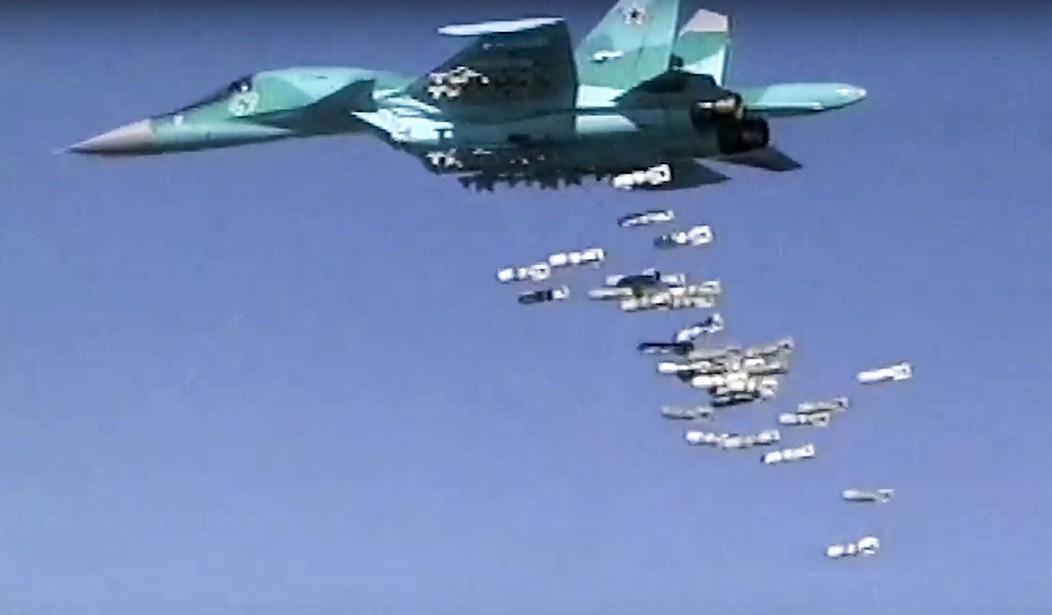Gravity bombs have evolved into suicide drones. More accurate ordnance does not necessarily make for better war-fighting.
One of the most popular dishes in Israel is the “bourakis”. It is a phyllo dough pastry filled with various goodies, such as cheese, mashed potatoes, or ground beef. They are often served as a first course at Israeli weddings, with gravy added to the beef or liver-stuffed versions. So there is a story of a waiter going around and ladling out gravy on every pastry he sees. Suddenly, he pours gravy into the pant pocket of a young man, who jumps out of his seat and hops around. As he poured cold water on his pants, the young fellow asked the waiter why he did what he did. “My instructions from the kitchen are to pour gravy wherever I see a pastry.”
There was an extraordinary picture last week of a UNRWA school attacked by Israel from the air. Two rooms of the structure were blown up completely, while the rest of the building looks relatively untouched. When Hamas started its “the Israelis are murdering civilians” song, Israel published the names of the terrorists eliminated in the strike. As of this writing, they have published 17 names of known terrorists among the 40 claimed casualties. Even if the ratio of terrorists to civilians does not change, that is an extraordinary accomplishment for a high-density urban war zone.
The development of smart bombs is one of the great accomplishments in the evolution of military weaponry. Everyone knows the stories of hundreds of bombers with thousands of airmen being unleashed on German targets in Europe during World War 2. Dozens of planes might be lost, with hundreds listed as killed or missing. After all of the effort and losses, maybe 5% or less of the bombs dropped actually hit the target. Even the British attack with an ancient Vulcan bomber on the Falklands in 1982 had a single bomb actually hit the target runway. It was enough to get the Argentinians to move their fighters off of the island, but the proven accuracy was as low as in the Second World War (the plane first flew in 1952).
Now, fast forward to Operation Desert Storm. Who could forget “the luckiest man in Iraq” or a bomb going down the chimney of the “Iraqi AT&T building”? A single F117 fighter or B2 bomber might accomplish with a single precision bomb what an armada of B-17s could not do with hundreds of bombs: hit the target dead-on. The JDAM system developed after the First Gulf War allows dumb bombs to be converted into GPS-directed smart munitions for about $20,000 apiece. It has led to a revolution in which virtually all dropped bombs today have a better than 90% likelihood of hitting their target within 10 meters. And, unlike Gulf War laser systems, it works in all weather and is not affected by dust or sand.
Recommended
The Ukraine and Gaza wars have expanded the use of drones enormously. Much of the fighting is being performed by drones. Drones have gone from surveillance and intelligence to active attack and suicide roles. One can see videos of $1500 Ukrainian drones saddling up to Russian T-90 tanks and setting them ablaze. Both Israel and Hezbollah have made much use of suicide drones. The Israelis use them to knock out terrorists in cars or on motorcycles while Hezbollah launches them at points of concentration for IDF forces; their knowledge of such locations apparently comes from earlier drone runs for intelligence.
The suicide drones and the drone-fired missiles that are in such use are a further development in smart munitions. Think of a relatively cheap drone flying into a target and exploding. This outcome obviates the need for a $100 million fighter or a $30 million missile-equipped Q9 Reaper or the like. Smart munitions are getting cheaper, more accurate, and easier to use. Hezbollah has twice used suicide drones to wound over a dozen Israeli soldiers meeting in northern towns. While the advantages of accuracy, flexibility, lower price, and ease of use are obvious, what are the downsides to smart weapons? Are there any downsides to replacing a thousand bombers and ten thousand airmen with a $2000 drone with a small but deadly payload that can be maneuvered until the point of detonation?
As payload delivery becomes more accurate and cheaper, the civilian population of a conflict goes from active war participants to mere spectators. In the day, anyone living within a mile of a Mitsubishi airplane factory or a German ball-bearing plant knew that he could be killed by large-scale Allied bombing. Today, Israel warns both Gazans and apparently Lebanese to leave buildings through “knock-knock” on the roof or SMS/phone calls. Israel directs Gazans with drone-delivered maps of where to go to get away from active fighting zones. If you want to get rid of Hamas or Hezbollah, you will need the IDF pushing hard from one side, with the locals pushing hard from the other. If the civilians feel more threatened by Hamas than by Israel, they will not force the terror group to stop fighting so that they can live a better life.
Maybe it’s just a coincidence, but since the mass introduction of smart bombs, the West has stopped winning wars. Can anyone point to great success on the battlefield since the First Gulf War? On the other hand, Israeli commandos on Saturday killed 210 Palestinians, terrorists, and civilians to get four hostages successfully out of Gaza and home to their families. Maybe there is something to learn from the Israeli op on how warfare should be conducted to win. Smart weapons may be appealing, but they have the downside of freeing the locals from the worry of being targeted. Additionally, it has upped the ante with world organizations that pounce on Israel when anything but a target is eliminated. While suicide drones are ingenious, one has to ask if they help bring us closer to victory or not. A young Iraqi studying in the US but drafted into Saddam's army during a vacation home said that the endless bombing of B-52s scared all of the soldiers hiding out in his bunker. Not accurate, but effective.

























Join the conversation as a VIP Member